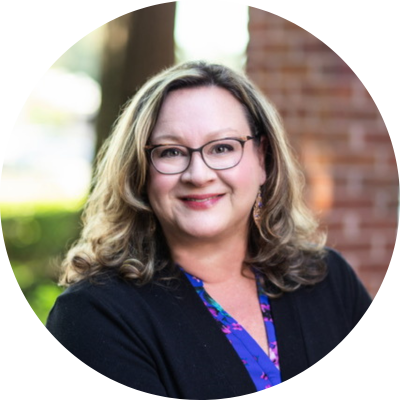Deacon Spotlight: Jonessa Howald Alexander
Jonessa Howald Alexander (BA 1997 in Psychology, Minors in Religion and Sociology)
President and CEO, United Cerebral Palsy of Georgia and United Cerebral Palsy of South Carolina in Atlanta, GA

Tell us about your current job role and employer. What are you currently working on?
United Cerebral Palsy of Georgia and United Cerebral Palsy of South Carolina support adults with intellectual and developmental disabilities (I/DD) by helping them maximize their potential to live a life without limits as they continue a lifelong journey of development and growth. I have been the President and CEO since January of 2024. Prior to that time, I was the Vice President of Operations, focusing on programming, clinical supports, and human resources.
What key personal and/or career experiences led you to where you are today?
The most pivotal moment in my career development happened when I was a junior at Wake Forest. I visited the campus Career Office and answered an ad from a family seeking afterschool childcare for their two elementary school-aged children. One of those children had autism, and that was the beginning of the path that led me to pursue a career supporting and advocating for people with intellectual and developmental disabilities. After graduating, I began working at a nonprofit in Athens, Georgia in a day program for adults with I/DD, and I have never looked back!
What is the most challenging aspect of your job? How do you navigate that challenge?
Direct Support Professionals (DSPs) are the people who work directly with the people we support who have I/DD. They carry out the mission of our organization, and we are facing a real crisis with our workforce. There are not enough DSPs to do all of the work that is to be done, both within our organization, and in the I/DD field in general. The funding that organizations like UCP receive is woefully inadequate, which leads to DSP wages that are simply unacceptable. We are working hard at the state level of both Georgia and South Carolina to advocate for better funding, which we will pass directly onto DSPs in the form of higher wages.
What advice would you give to Wake Forest graduates about developing their personal life habits after college (finances, health, values, work/life balance)?
I think healthy personal habits are all about intention and follow-through. Like many people, I am intentional in my work habits. I learned early in my career that structure and schedules work best for me. I wish that I had applied this level of intentionality to my personal habits when I was much younger. If you are intentional about scheduling time for physical wellness, for relationships, for spiritual growth, FOR REST, work/life balance tends to take care of itself.
We know that relationships are important for any kind of development. How do you build and maintain your network?
I think the key to building and maintaining a network, whether personal or professional, again goes back to the idea of intention. I am an introvert by nature, so if I’m not intentional about making time to nurture relationships, I have a tendency to cocoon – COVID did not help this tendency! For me, this means scheduling time for uninterrupted conversation (preferably face-to-face) with people in my network. There are a number of people in my life with whom I have a standing monthly lunch or dinner. If it’s on my calendar, it’s much more likely to happen!
Tell us about your mentoring relationships. What impact have these relationships had on your career and life?
I have been extremely fortunate to have been hired by two leaders in the I/DD field who mentored me in very different ways through different phases of my career.
My first mentor saw potential in a very green 23-year-old DSP and supported me through progressing to the Assistant Director position at the organization. He also encouraged me to get my Master of Public Administration at the University of Georgia and allowed me to go to school full-time while maintaining my full-time position.
My second mentor, the previous President and CEO of UCP of Georgia and UCP of South Carolina, hired me when my son was 18-months old. I was very apprehensive about my ability to balance a demanding work and travel schedule with motherhood. She coached me through everything from co-sleeping to the triumphs and heartbreaks of recreational sports, all while simultaneously preparing me to become the President and CEO upon her retirement.
What advice would you give to current Wake Forest students and/or young alumni who are interested in working in your industry?
My biggest piece of advice to students interested in working in any industry, but particularly in the I/DD field, is to be willing to take an entry level position upon graduation. My experience as a DSP has been critical to my perspective and my success as an executive.
My second piece of advice is to keep an open mind about career opportunities. When I was in college, working as a nonprofit executive was not on my radar at all. I had no idea where that visit to the Career Office would take me, but now I can’t imagine doing anything else!
What’s next for your career? What future goals or plans are you pursuing?
For now, I am still settling into my role as the President and CEO of UCP of Georgia and UCP of South Carolina. In the future, I would like to focus on enhancing our use of Business Intelligence and diversifying our revenue streams so that we are able to more effectively fulfill our mission.
Story published in May 2024. For current updates about Jonessa, visit her Linkedin profile.
